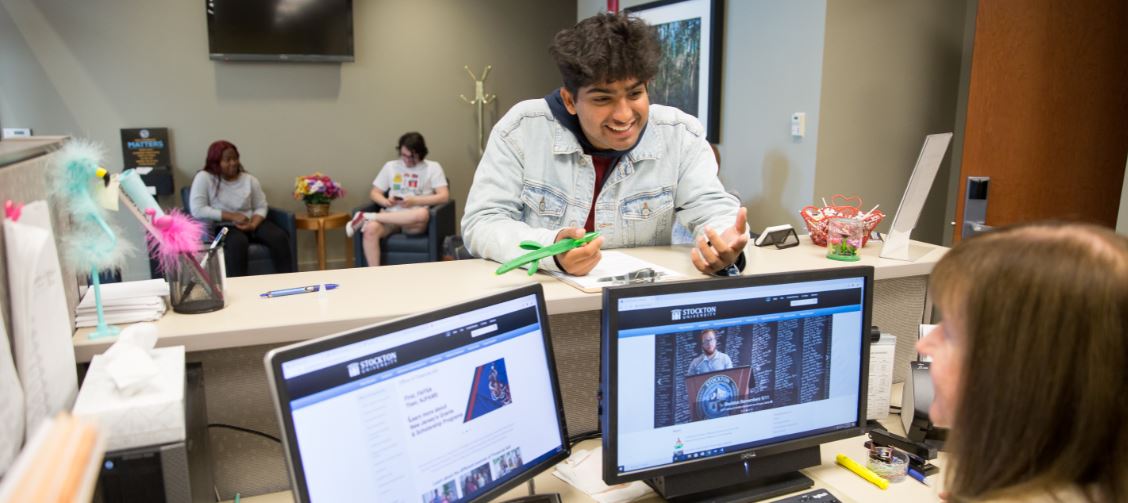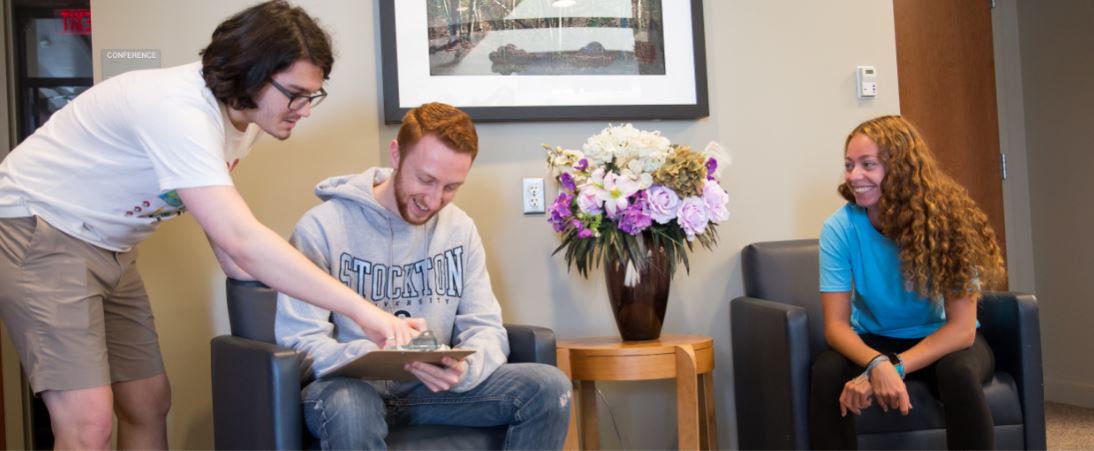Consumer Information
Each year, a school must disseminate to prospective and enrolled students required information under the Higher Education Act of 1965, as amended, and the Family Education Rights and Privacy Act (FERPA) and the procedures for obtaining the information. See below for Consumer Information. For more information under the Higher Education Act (HEA), click here.
Sources of Financial Aid & How to Maintain Continued Eligibility
There are several sources of need and non need-based financial aid available to undergraduate and graduate students. These include Federal, State, Institutional and Private programs that give grants, scholarships, loans and employment opportunities to eligible students. To learn more about the sources of financial aid, click here.
How to Apply
Completing the Free Application for Federal Student Aid (FAFSA) is the most important step for anyone applying for financial aid, but did you know there are other steps involved in the application process?
Visit stockton.edu/fafsa to view each of the steps in the financial aid process.
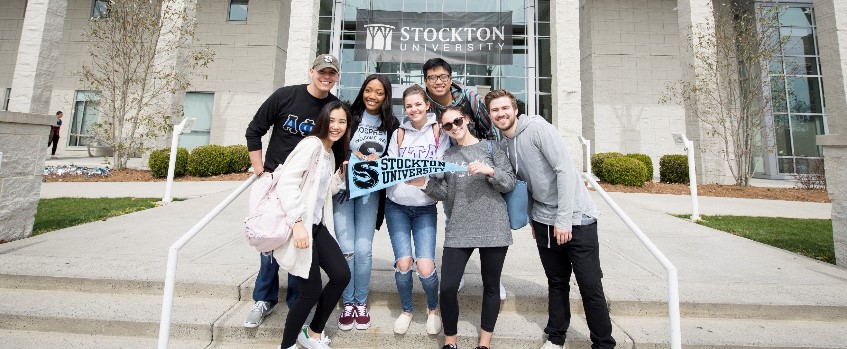
How Need and Eligibility are Determined
Once you complete a FAFSA and each of your financial aid requirements, your financial need is determined. Financial Need is calculated based on a formula developed by the federal government.

2024-2025 Academic Year and After:
The formula uses three factors to determine need, Cost of Attendance (COA), Student Aid Index (SAI) and Other Financial Assistance (OFA). Your SAI is calculated based on the information provided on your FAFSA.
To learn more about how need and eligibility are determined, click here.
Cost of Attendance (COA)
The Cost of Attendance (COA) is determined using rules established by law. The COA includes direct costs (what students are billed for) and indirect expenses (potential expenses).
Direct Costs include:
- Tuition and fees
- On-campus housing and food (if applicable)
Indirect Expenses include:
- Off-campus housing and food (if not residing on-campus)
- An allowance for books, course materials, supplies, equipment, transportation and other miscellaneous personal expenses
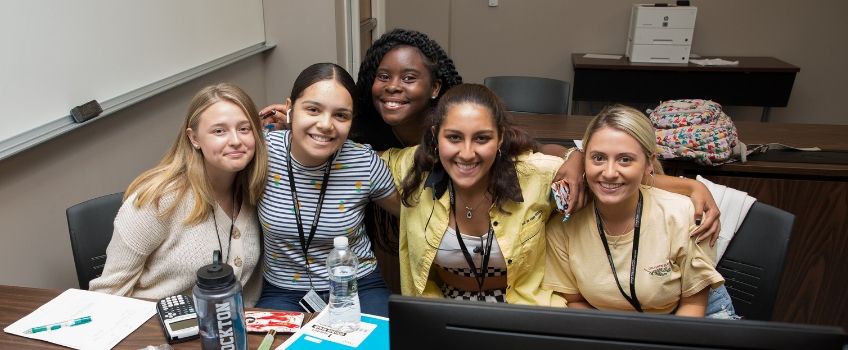
The COA is not your bill. To view the COA for the current academic year, click here.
For actual costs for tuition, fees, housing and food, please visit stockton.edu/bursars
Students also receive COA information in their financial aid offer each academic year.
How Aid is Disbursed
Financial Aid is disbursed (paid to a student’s account) through electronic systems that work with those of aid partners including the U.S. Department of Education. Disbursements typically occur during the first week of October for the fall semester, the first week of February for the spring semester and throughout the summer semester depending on the start of sub-term classes. Once initial disbursement has occurred, disbursements are continuously on-going throughout the semester and notifications are sent to students as these funds disburse.

Eligible student accounts are credited after the add/drop period and once all requirements are complete and enrollment and attendance have been confirmed. Aid is typically disbursed evenly between the fall and spring semesters. Students who have a credit balance on their bill are issued a refund either through a check in the mail or by EFT for those who have signed up for direct deposit.
For more information about disbursements, click here or contact the Office of Financial Aid at 609.652.4203. For more information on refunds, visit stockton.edu/bursars or contact the Bursar’s Office at 609.652.4597.
Once a student files the FAFSA, they may be randomly selected by the U.S. Department of Education, for a review of their financial aid eligibility and/or financial aid application. Stockton University is required by federal regulations to verify all information required by the U.S Department of Education as well as the information reported on the application of each student selected.
In order to comply with these regulations, we may need to collect additional documentation from students, parents and/or spouse's.

Students are responsible for completing these requirements as soon as possible in order to receive aid. Financial aid will not be processed until all requirements are completed. Any student who does not comply with verification requirements and complete the process within the academic year for which aid would be offered will not be eligible for financial aid.Once all requirements are completed and a review is finalized, student’s whose aid is adjusted due to this process will receive a revised financial aid offer notification within 7-10 business days of the completed and processed review.
Click here to learn more about the verification process.
Please Note: The Office of Financial Aid reserves the right to request verification of any data submitted by parents or applicants. If the data is found to be incorrect, the data may be corrected and the financial aid offer will be revised. If the applicant is determined ineligible for financial aid, the applicant’s offer can be withdrawn. The applicant will then be responsible for payment of all expenses incurred at Stockton University.
Terms & Conditions of Financial Aid
As a financial aid recipient, it is your obligation to know your Rights and Responsibilities and the Terms and Conditions to receiving financial aid.
Click here to learn more about the Terms and Conditions of Financial Aid Offers. View additional Terms and Conditions on stockton.edu/finaid and studentaid.gov.
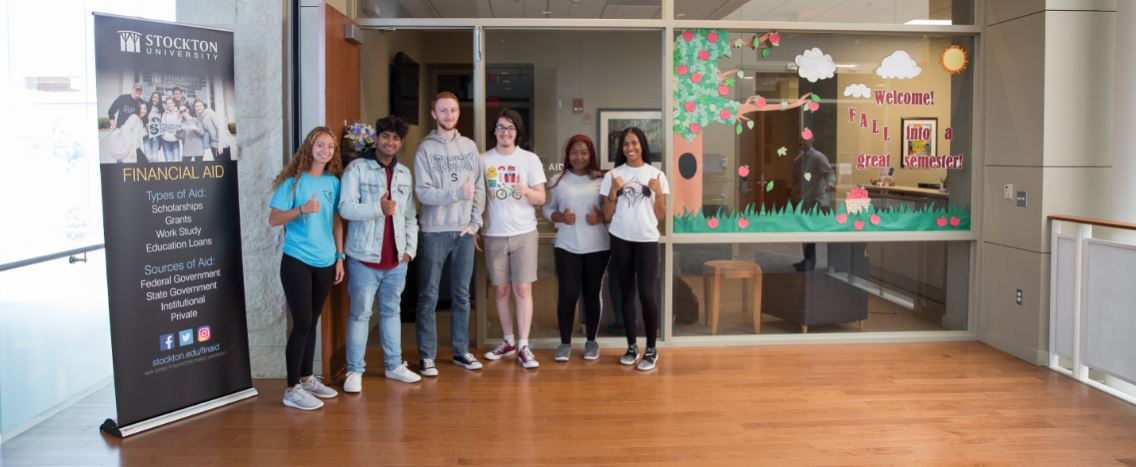
Terms & Conditions of Federal Work Study
The Federal Work-Study Program (FWS) is a part-time employment program for students with demonstrated financial need as determined by the Free Application for Federal Student Aid (FAFSA). Funding is limited and offered on a first-come, first-served basis allowing students to earn monies to help pay postsecondary educational expenses. Students apply by filing a FAFSA.
Learn more about the FWS program and view Terms and Conditions here.
Federal Direct Loans: Terms & Loan Requirements
Students may be eligible for Federal Direct Subsidized and/or Unsubsidized Loans by completing the FAFSA. A student may be eligible if they are enrolled in a degree seeking program and hold at least half-time status (6 credits for undergrads and 5 credits for graduate students) each semester at Stockton University. Eligible students borrow directly from the U.S. Department of Education.
To have these loans applied to a student's account, the student needs to accept them and complete Entrance Counseling and a Master Promissory Note on studentaid.gov. Visit stockton.edu/fafsa for instructional videos guiding you through the process.
Federal direct loans are offered at the beginning of an academic year and are based on expected half-time enrollment for two semesters. Per federal regulations, institutions are required to prorate loans for graduating undergraduate students when their final period of enrollment is less than a full academic year. Learn more about Federal Direct Loan Proration click here or contact the Office of Financial Aid at 609.652.4203.
If you graduate, withdraw, are dismissed, fall below half time enrollment or take a leave of absence, you are required to complete Exit Counseling, which will give you an understanding of how to start repaying your loans.
There is a lifetime limit you may borrow from the U.S. Department of Education. To learn more about lifetime eligibility, visit studentaid.gov.
Learn more about Federal Direct loans here and at studentaid.gov.
Exit Counseling
If you have received a subsidized, unsubsidized or PLUS loan under the Direct Loan Program or the FFEL Program, you must complete Exit Counseling each time you:
- Drop below half-time enrollment
- Graduate
- Leave school
Exit Counseling provides important information regarding your rights and responsibilities to the federal loans you borrowed while attending school. It also provides examples of the various repayment plans available and loan forgiveness options for certain professions. It is an important and valuable tool to prepare you for loan repayment success.
You must complete Exit Counseling no sooner than 30 days prior to your graduation date. Our office will be notified electronically once you have successfully completed the module. This process usually takes 1-2 business days. Holds are placed on your Stockton academic transcript and degree until the requirement is complete.
If you have completed your Exit Counseling during a previous term of enrollment, you must complete a new Exit Counseling 30 days prior to your graduation date.
Loan Repayment
Students will begin repayment on the principle 6 months after they stop attending half time or graduate.
It is important for students to be proactive and be sure they are making their payments on time. Students who make late payments or do not repay their student loans will be subject to late fees and could go into loan default, which affects their credit and ability to borrow in the future.
Below is a sample Loan Repayment Schedule for a sample loan of $3,500 with an interest rate of 3.73% and a standard 10 year repayment term.
| Year | Total Payment | Principal | Interest | Total Interest | Unpaid Balance |
|---|---|---|---|---|---|
| 0 | $3,500 | ||||
| 1 | $419.88 | $294.33 | $125.55 | $125.55 | $3,205.69 |
| 2 | $419.88 | $305.49 | $114.39 | $239.94 | $2,900.22 |
| 3 | $419.88 | $317.10 | $102.78 | $342.72 | $2,583.15 |
| 4 | $419.88 | $329.11 | $90.77 | $433.49 | $2,254.05 |
| 5 | $419.88 | $321.26 | $78.26 | $511.75 | $1,912.47 |
| 6 | $419.88 | $354.58 | $65.30 | $577.05 | $1,557.92 |
| 7 | $419.88 | $368.02 | $51.86 | $628.91 | $1,189.92 |
| 8 | $419.88 | $381.99 | $37.89 | $666.80 | $807.96 |
| 9 | $419.88 | $396.48 | $23.40 | $690.20 | $411.50 |
| 10 | $419.88 | $411.52 | $8.36 | $698.56 | $0 |
Learn more about loan repayment here.
The Teacher Education Assistance for College and Higher Education (TEACH) Grant Program provides grants for students who intend to teach full-time in high-need subject areas for at least four years at schools that serve students from low-income families. Applicants must be accepted into the Master of Arts in Education (MAED) program and complete a FAFSA.
Each year the applicant must complete TEACH Grant Counseling and a TEACH Grant Agreement to Serve. If any student fails to complete the four-year teaching obligation, the grant will be converted to an unsubsidized loan and must be repaid with interest.
When the student graduates, changes to a program that is not TEACH Grant-eligible, or leaves the institution, Exit Counseling also is required.
Visit studentaid.gov or contact the Office of Financial Aid at Stockton University for more information.
Satisfactory Academic Progress (SAP) Policy
Satisfactory Academic Progress (SAP) is evaluated annually in June. Students enrolled in summer classes will be evaluated in August.
At the time of each evaluation, a student who has not achieved the required GPA, or who is not successfully completing his or her educational program at the required pace, is no longer eligible to receive financial aid. However, students who have experienced extenuating circumstances beyond their control may appeal to be reinstated.

Students who have been granted financial aid based on an approved appeal and academic plan will be evaluated at the end of each semester of enrollment.
Students must meet both GPA and PACE measures so that they will complete your degree program without exceeding the Maximum Timeframe allowed for their degree program.
Click here to learn more about the criteria for measuring academic progress and how a student who has failed to maintain SAP may reestablish eligibility for federal financial aid.
Study Abroad Programs
Traditional Study Abroad Programs:
Education Abroad opportunities are developed and/or administered by the Office of Global Engagement (OGE), and students are urged to consult with the OGE early in their planning for study abroad.
Financial aid is available to students attending study abroad programs approved for credit by Stockton University. Enrollment in any program of study abroad approved for credit by Stockton may be considered enrollment at Stockton University for the purpose of applying for Title IV aid (federal financial aid).

Students participating in study abroad programs will meet with the Office of Global Engagement to begin the process. The student will submit a cost sheet to the Office of Financial Aid. After filling out the cost sheet, the office sends the document to the study abroad provider. Aid is then processed and sent to the service provider.
Faculty Led Programs:
There is no additional financial aid offered for faculty lead study abroad programs. Students who enroll in a faculty led program will see charges for the program reflected on their bill. If there is more than enough already offered financial aid, this aid can be used to cover these program costs. To learn more, visit the Office of Global Engagement.
Click here to learn more about study abroad opportunities and processes. Click here to learn more about Study Abroad Transfer Credit Policies.
Return of Title IV Funds
The Office of Financial Aid may have to make adjustments to a student's financial aid based on changes in their enrollment.
Students who completely withdraw from the university or declare a leave of absence during an academic semester will have their aid adjusted up through the 60% point of the term. This means that some financial aid funds may have to be returned to federal and state governments when a student withdraws. This process is called Return of Title IV and is required by law.
Learn more about the Return of Title IV funds process here.
Purchasing Books with Title IV Aid (Federal Financial Aid)
Students with a credit balance of federal aid on their account, which occurs when a student's financial aid is more than enough to cover their charges are able to use these funds to obtain books and supplies.
To utilize these funds, students can transfer up to $1,500 on to their Stockton student ID card, also known as the Osprey Card. The process allows students to transfer funds to the Osprey Card starting two weeks before the semester begins, giving students the opportunity to obtain their books and supplies before the conclusion on the first week of the semester.
Students may opt out of this process by deciding not to transfer the funds on to the Osprey Card. Any remaining balance of financial aid funds will then be issued to the student in the form of a refund after financial aid funds have disbursed.
For more information, visit stockton.edu/bursars.
University Refund Policy
A refund occurs when there is an overpayment on a student's account, meaning that either payments made or financial aid was more than enough to cover the charges. A refund will be issued ONLY if there is a credit remaining after all payments, deposits and financial aid have been applied to a student's account.
**The Bursar's Office reserves the right to withhold refund checks if a student has a past due balance. Our office will withhold the refund check until any past due balances are settled.**
Click here to learn more about refund policies and procedures.
Official Withdrawal from the University
To officially withdraw from the university, a student must complete the official withdrawal form with the Office of Student Records.
The form and more information can be accessed here.
Title IV is federal financial aid funding. Qualified institutions participate in the administration of Title IV funding on behalf of the federal government. Students apply for federal financial aid funding (Title IV funds) by filing a FAFSA each year. File at fafsa.gov.
Any institution that participates in any Title IV loan program must develop, publish, and enforce a student loan Code of Conduct. The Code of Conduct prohibits conflicts of interest with the responsibilities of the institution's officers, employees and agents related to Title IV loans.
Stockton University's Title IV Student Loan Code of Conduct is below.
The institution’s Code of Conduct includes a ban against each of the following:
- Employees shall not enter into revenue-sharing arrangements with any lender, including Title IV or private education loan lenders;
- Employees shall not accept gifts from a lender, guaranty agency, or loan servicer;
- Employees shall not accept any fee, payment, or other financial benefit (including the opportunity to purchase stock) as compensation for consulting or other contractual arrangement to provide education loan related services;
- Employees shall not steer a first-time borrower’s loan to a particular lender through packaging or any other method (for example, the school’s website or publications);
- Employees shall not refuse or delay certification of any loan based on a borrower’s lender selection;
- Employees shall not request or accept from any lender offers of funds for making private education loans (including opportunity pool loans) in exchange for providing concessions or promises for providing a specific number or volume of private loans, or for private loan preferred arrangements;
- Employees shall not accept call center or financial aid office staffing assistance from any lender, except under certain limited circumstances specified in statute and regulation; and
- Employees shall not accept compensation for service on advisory boards, commissions, or groups established by a lender or guarantor (or a group of lenders or guarantors), except for reimbursement of reasonable expenses incurred for such service.
*Employees encompass financial aid office or other school employees with financial
aid or education loan-related responsibilities.
The University shall enforce the above Code of Conduct by annually informing employees
of the provisions listed.
Students seeking private/alternative loan options can explore a historic list of lenders here.
The lenders and loan options presented include lenders who made a loan at the school
within three academic years.
The University does not participate in any preferred lender arrangements. You are free to choose any lender, including those not presented. If you choose a lender that is not presented, please contact the Office of Financial Aid. Application processing will not be delayed unnecessarily if you choose a lender not presented.
Our officials are prohibited from accepting any financial or other benefits in exchange for displaying lenders and loan options in FASTChoice. Prohibited activities include: receiving compensation to serve on any lender board of directors or advisory boards; accepting gifts including trips, meals, and entertainment; allowing lenders to staff our institution's financial aid office; allowing lenders to place our institution's name or logo on any of their products; and owning of lenders' stock (for college officials who make financial decisions for our institution).
Many times, a student's parent or other person may want to speak to our office about a student's account.
Students who want to designate a proxy (parent or other person) to view specific educational records should go to the Proxy Management link in the goPortal. The Proxy Managagement link is in the Student Services tab under Student Tools.
We are unable to speak about a student's account with anyone that has not designated as a proxy.
Click here to learn more.
Office of Financial Aid at Stockton University:
(609) 652-4203
*Contact the Office of Financial Aid for questions regarding your financial aid offer and the processing of your financial aid at Stockton University.
The University contact person for Consumer Information is Marielena Dottoli, assistant director of Financial Aid. Email Marielena.Dottoli@stockton.edu with questions and for additional information.
Office of Admissions at Stockton University
(609) 652-4261
*Contact the Office of Admissions with questions regarding eligibility criteria for Institutional First Year and Transfer Scholarships.
Bursar's Office at Stockton University:
(609) 652-4597
*Contact the Bursar's Office for questions regarding billing.
US Department of Education:
(800) 433-3243
*Contact the US Department of Education for questions regarding an FSA ID, the FAFSA, Entrance/EXIT Counseling/Master Promissory Notes, Direct Loan Borrowing History and any Federal Financial Aid Programs.
NJ Higher Education Student Assistance Authority (HESAA):
(800) 792-8670
*Contact HESAA for questions regarding State Financial Aid Programs.
